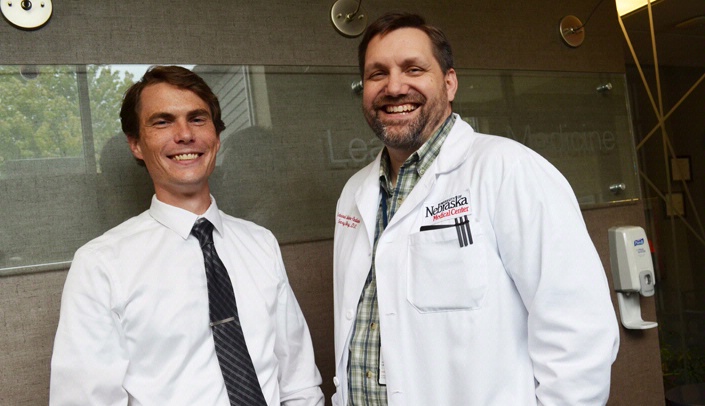When Gary Ullery, D.O., is feeling stressed during his residency at UNMC, he turns to Christopher Smith, M.D.
Dr. Smith, an assistant professor in internal medicine, is a participant in the department’s faculty-resident mentoring program, a formalized program that grew out of a peer-mentoring program within the division.
Making the matches
Finding the right mentor for a resident is a mix of art and science.
“We wanted a way to make the pairings based on some kind of mutual interests, because there is evidence that mentoring relationships work better if people have that kind of chemistry,” Dr. Smith said.
To provide an opportunity for prospective mentors and residents to get to know each other, the department hosts a lunch, during which the program is outlined, including its structure and expectations.
“Most of the time is a mingling session,” Dr. Smith said. The department also holds an off-campus mixer.
“It’s just a nice way to do away with some of the formality and sense of hierarchy,” he said.
Residents then submit a list of the faculty members that they feel would be a good match, and the department tries to pair them with one of the faculty members they’ve listed.
“That’s our attempt to make it as good a pairing as we can,” Dr. Smith said.
“Dr. Smith actually was my very first attending on day one,” Dr. Ullery said. “So I had already developed a rapport with him — we had hit it off pretty well, so it was a natural fit.”
Although participation in the program is voluntary — “It’s really hard to force someone into a good relationship,” Dr. Smith said — there are established expectations for both mentor and mentee.
“These are things we try to point out very early,” Dr. Smith said. “The mentee needs to be proactive in the relationship. They need to be setting agendas. They need to be open to feedback. The mentors need to make themselves available and be willing to challenge their mentees to become better physicians.”
Dr. Ullery said the relationship provides an avenue of feedback that might not otherwise be available to residents.
“It’s very professional, but the relationship is more than just an attending to resident,” he said. “It’s much closer.
“The fear that most people have is that of the unknown,” Dr. Ullery said. “When you have someone who can guide you through the unknown, it becomes more of a learning opportunity. Every time you go into a new rotation, that’s a new adventure, and it’s that fear of the unknown, and when you take away some of that fear, then it really becomes a much better learning experience.”
The department has surveyed residents to refine the program.
“We asked a number of different questions of the residents,” Dr. Smith said. “‘Are we meeting the needs of the residents as mentors?’ And we saw a nice improvement in survey responses as the program was implemented.”
The goal of the program is to address mentorship both in the educational, professional, and personal development of the resident.
“Making sure things like work-life balance don’t get lost in the shuffle,” Dr. Smith said. “A lot of times that’s an aspect of being a physician, especially an early-career physician or physician in training, that is easy to overlook that we know it is really important.”
Dr. Ullery’s advice to new residents? Get a mentor.
“Seek their advice for anything,” he said. “They really, really want to help.”
